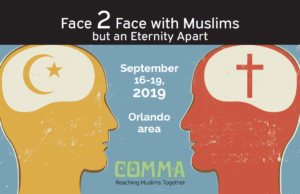
By Paul Martindale
A few years ago, in a dialogue meeting at a mosque I decided to test out an idea for communicating theological truth to Muslims. I was the speaker that month for the Christian part of the dialogue and the topic was salvation in Islam and Christianity. We had three goals for this dialogue meeting: communicate the Christian doctrine of salvation in a way compelling to Muslims, point out the self-contradictions in the Muslim doctrine of salvation, and deepen our relationship with this Muslim community. The trouble was that two of these goals could be somewhat incompatible depending upon how much they were emphasized. How can we point out the self-contradictions in Islamic theology without damaging the relationship with Muslims? Is there a way to remove or dismantle the theological barriers without alienating the Muslim person?
I decided to start by making a positive presentation of salvation from a biblical perspective using many of the Arabic words that come close to the concepts of redemption, redeemer, and redemption price, and contrasting this to the Islamic terms that are typically used for well-being, surrender, etc. At the end of the presentation I included a section of some 12 or 14 points representing the unanswered questions, apparent self-contradictions, and flaws of the Islamic doctrine of salvation in a way that I thought would be challenging yet palatable to the Muslims present. The way I stated this was to say to the Muslims present, “Here is a list of the issues that you would need to adequately address in order to convince me of the Islamic view.” Rather than just presenting a polemic attack, I felt that this might be compelling for Muslims motivated to win me over to their point of view. After all, this took place in a dialogue meeting where different concepts are being compared. I had identified for them what it would take to win me as a convert to Islam. Should they decide to pursue this with me I felt that each of these objections would help them refine their understanding of how the gospel differs from Islam on this topic, potentially leading them to a more accurate understanding and conviction of biblical truth.
One of the assumptions of this approach is that people can learn a new concept best when they can compare it to a similar concept that they already know. Seeing the differences between the two is easier than learning a brand-new concept without reference to anything familiar. Another assumption of this approach is that we can learn and understand Islam as cultural outsiders with accuracy and without distorting how they interpret Islam. I believe this is possible if we ask good questions of our Muslim friends and allow them to express their interpretations. It is always helpful to learn what Islam, as it exists in its texts, teaches but ultimately the fact that the individual Muslim interprets these texts for himself/herself means that no two Muslims have the same exact interpretation.
During the ensuing discussion in the Q & A segment one theological issue stood out for the Muslims. They objected to what they viewed as “a carte blanche” for sinning and that Christians paid so little attention to their good works. It seemed to them that the role of works in Christianity was inconsequential while in Islam their salvation depended upon them. This forced us to formulate and articulate for them a Christian theology of works. While works does not contribute to justification, we quoted from James that works accompanies justification and is a sign that salvation is genuine. Therefore, the absence of good works would be a serious problem for Christians.
The Muslims present expressed appreciation that works are taken seriously in Christianity and they could see that works had different roles in the two theological systems. In Islam works are salvific, but in Christianity works attest to the work of justification without contributing to its acquisition. A theological barrier to understanding was removed and the Muslims present had a greater respect for Christianity as a result.
At our upcoming COMMA consultation in Orlando I will be presenting a session on “The Importance of Engaging Islamic Theology” in our witness with Muslims. I hope you will be challenged and stretched in your approach to Muslims through this and other topics presented at COMMA. Consider inviting someone to attend COMMA and don’t forget to register today!